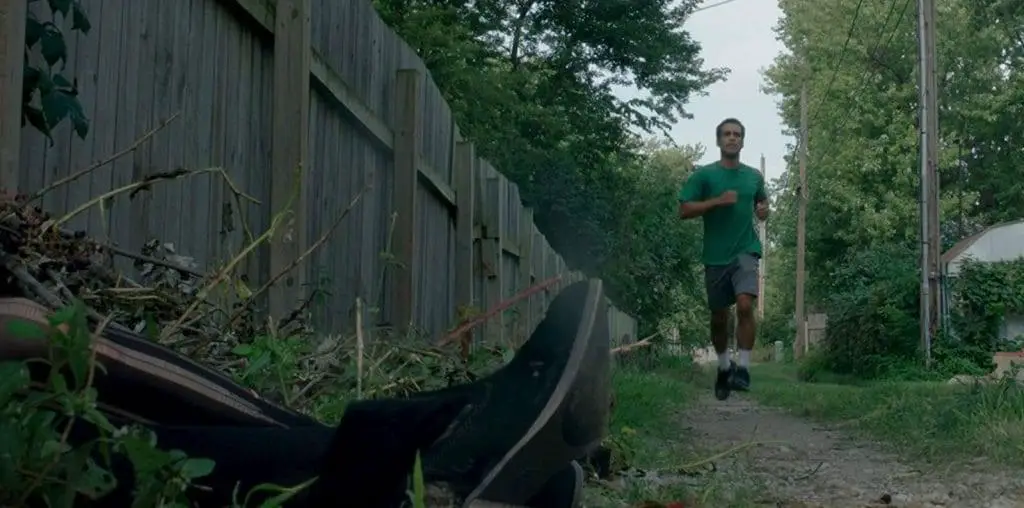
This review was originally published on January 27, 2013…
The perfect ending of Richard Linklater’s beautiful Before Sunset left viewers feeling romantic without really addressing the truth of what was happening – Jesse (Ethan Hawke) was leaving his wife and son for Celine (Julie Delpy). Nine years later, Linklater opens his film with a bittersweet reminder that even the great love stories have repercussions as Jesse bids farewell to his son Hank at a Greek airport. Hank has spent some of his summer with Jesse & Celine, who are now married with twin girls. As the children sleep, the pair drives back into town from the airport and the brilliant interplay of dialogue that has defined these three films begins. Celine may have a new job while Jesse longs to find a way to get Hank back into his life, even if that means uprooting his current family back to the States.
Once again, the latest chapter in the saga of Jesse & Celine plays out over the course of a short amount of time. It is essentially four scenes – the car ride back, a brief separation as Jesse speaks to some of his friends in Greece while Celine helps make dinner, the actual dinner with their Greek friends, and a walk to a hotel that Jesse & Celine plan to use for one last glorious night on their vacation. Things don’t go exactly as planned as the conversation that makes up the entirety of Before Midnight turns in unexpected ways and goes to some dark places. Jesse has been emotionally rattled by his son’s departure and Celine seems concerned that it could lead to another rash decision. The crossroads leads to the emergence of some skeletons from Jesse & Celine’s closet as the two verbally spin through years of love, regret, and the major & minor decisions that make up a marriage.
Few films have ever captured the way two people love and hate in the same moment as completely as Before Midnight. People who have been together a decade know what to say to each other to lift them up but also know what buttons to push when they feel up against the wall. There’s truth in the stunning dialogue of Before Midnight that has rarely been found in any films about married life. Every major decision like the one that Jesse made at the end of the last film comes with a ripple effect and comes with questions. What if Jesse had handled the end of his first marriage better instead of just missing his flight? What if Jesse hadn’t used his relationship with Celine for two hit books? What if Celine puts her foot down and stands up for herself now? It’s not only a film about those moments in which we consider the decisions we’ve made in the past but the moments that makes us worry about the future.
What’s so breathtaking about Before Midnight is the honesty of this truly stunning script from Hawke, Delpy, and Linklater. There are many films in which a couple’s chemistry makes their on-screen relationship easy to believe but few where the characters have felt this completely three-dimensional, as if they have existed for the nine years since the last movie and will go on after these credits roll. Hawke & Delpy disappear and we’re left fully believing the concocted last-decade of Jesse & Celine’s life. When they love, it feels real. When they fight, it feels painful. The realism of their dialogue combines with the fact that the structure of these films makes the time away from them easier to believe (only getting one day every nine years makes the time that passes in between feel more organic) to make a film that feels as true as any relationship drama of the last several years.
Credit goes primarily to the splendid screenplay but the actors deserve praise as well, especially Delpy who never takes the easy route with Celine, turning her into a truly complex character. Celine has become a romantic ideal for thousands through Jesse’s books and she’s certainly sacrificed a lot over the years, but Delpy never overplays the potential victim of the role. In fact, some early reviews have claimed that it is Delpy’s character who is “in the wrong” in the film’s most heated moments. I think that’s an awfully reductive way of looking at the film (and flat-out wrong in some key respects). One of the movie’s true strokes of genius is that it doesn’t ask us to take sides. Like so many marital disagreements, there’s right & wrong on both sides of the debate.
Before Midnight starts slow (although there’s such verbal acuity in that first scene that I actually thought to myself, “I could just watch them drive back from the airport for two hours”) but it builds to a final hour that stands among the best filmmaking in quite some time in any genre. Linklater shows great restraint, often shooting his actors in unbroken shots as they walk or, later, from the corner of the room, as if eavesdropping. And once again, the newest Before film finds a note-perfect way to end. Some have called this the conclusion, arguing that this is one of the best trilogies of all time. I don’t want to close that door yet (and, yes, it is one of the best trilogies of all time). Linklater, Hawke, & Delpy have found a way to capture the wide-eyed romance of love in our 20s, the renewed optimism of lost passion in our 30s, and, now, the complex truth of married love in our 40s. There’s little reason to think they can’t do it again in nine years. Until then, let’s just enjoy this true gift, a masterful examination of life, love, regret, secrecy, passion, and the need for two people to retain personal identities along with their identification as a couple.
